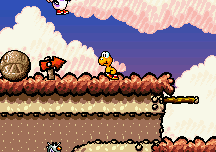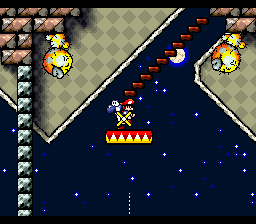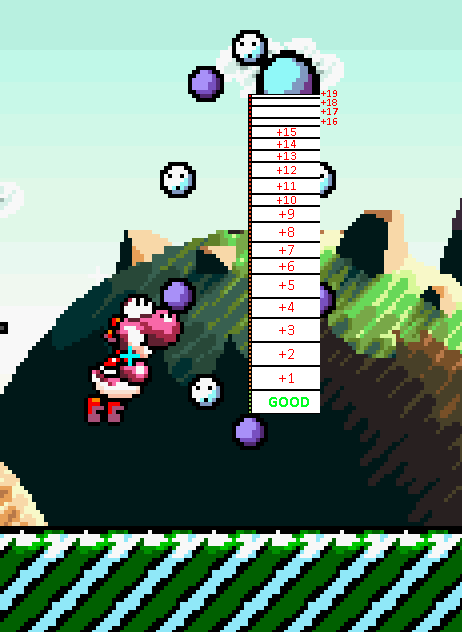Movement
Contents
Avoiding Slopes
- Just about every slope is slower to run across than flat terrain, therefore, you want to jump over every slope if you can.
- If a slope is unavoidable, the slowdown can be minimized by jumping off of the slope as soon as possible and in the case of a perfect jump, the slope won't slow you down at all.
- Tutorial.
Tonguing
- Using Yoshi's tongue normally slows you down but this can be avoided by only tonguing while in the air and releasing the dpad after initiating the tongue. You can resume holding left or right once Yoshi's tongue is almost fully retracted into his mouth.
- Holding left or right while tonguing will reduce your speed by half.
- Holding Y longer makes Yoshi's tongue longer.
- You can also tongue and obtain items like eggs and keys [1] through walls and ceilings.
- This tutorial explains how to tongue without losing speed.
In the video on the right, the first 4 tongues are performed while holding forward the entire time, then the rest are performed while the dpad is released. As you can see, there is no speed lost when the dpad is released.
Making Eggs
- If Yoshi swallows an enemy on the ground, he almost comes to a complete stop, therefore, all eggs should be made in the air if possible.
- Holding left or right during the egg-making animation will cause Yoshi to slow down to half speed.
- The optimal way to make eggs is to:
- 1. Jump and tongue an enemy.
- 2. While traveling at max speed and in the air, let go of the direction you're running and tap down on the dpad for 1 frame
- 3. Keep holding jump and do not land until the egg-making animation is finished (still not holding any directional input).
- 4. Resume holding the direction you were running when the egg-making animation ends.
- This tutorial explains how to make eggs without losing speed.
In the video on the right, the first egg is made on the ground, resulting in a complete stop. Then, 4 eggs are made while holding forward, resulting in significant speed loss. Finally, the last 3 eggs are made with the dpad released which retains full speed.
Perfect Jump
Perfect jumps are performed by jumping on the first frame Yoshi lands on the ground or platform. When you do a perfect jump, the game does not register Yoshi as having landed on the ground. This can be both good and bad:
- You don't get an automatic flutter as a result so you run the risk falling into lava, pits or spikes if you don't react in time.
- The screen will not follow Yoshi vertically which means enemies and other sprites will not be loaded until the screen scrolls up. However, this actually allows you to skip an auto-scroller section in 6-5.
- A perfect jump also allows you to store an extended flutter so it can be used after the jump to allow for even more height. This can be used for a variation of the 1-2 skip.
- This same setup can also be used in 1-1 100% to reach the top area. [2]
In the video on the right, it is shown that simply bouncing on a Shy Guy does not give you enough height to reach the cliff. Then, a Shy Guy bounce followed by a failed perfect jump does not give you the extended flutter. Finally, the perfect jump is executed, allowing for the extended flutter thereafter.
Ground Pound
- A ground pound causes Yoshi to fall 2x faster than normal, however, the ground pound takes 37 frames to do (8 frames to start it, 22 to do the animation and 7 to land) and it also reduces your speed to 0 so it's preferable to only do them when necessary. [3] [4]
- Ground pounding into pipes can skip the landing animation, though you would want to do a pipe jump to save the most time.
- Ground pounding while travelling up towards a door will save 2 frames if you get a 1st frame door entry. This is because you're entering the door during the ground pound animation rather than after landing and then entering.
- Objects such as crates and posts can be ground pounded slightly faster by being as close to the object as possible when initiating the ground pound. This is because the ground pound hits while Yoshi is doing the spinning animation rather than when he lands.
- There are a couple other uses of the ground pound like the blast off trick at the end of the Hookbill boss fight and the stompception trick.[5]
Slope Speed Oscillation
- It is possible to gain a very slightly higher than normal running speed by jumping off of a slope. This can be used to skip certain bonus games in 100%, such as the one in 1-3 [6] or 2-2 [7].
- Important Note: There is a 1 in 3 chance of losing the higher speed when jumping off of a slope!
- For Any%, speed oscillation isn't something to worry about because you'll want to jump over every slope anyway. It's not worth jumping off of a slope to get a higher speed when the slope could be avoided completely, since the time lost by touching the slope would be greater than the time saved by the higher speed. The exception to this is when the slope is unavoidable, like at the end of the last slope in 2-2, in which case, it's best to stay on the ground and not jump to potentially save a little bit of time.
This video explains and demonstrates speed oscillation.
Miscellaneous Information
- Running off of a ledge causes Yoshi to fall at max speed, thus, the quickest way to fall down from an area is not to jump like in other games, but to simply run off of the ledge. [8]
- The quickest way to move up stairs is to walk along them for a split second and then jump. Jumping too quickly results in a significant speed loss.[9]
- Jumping on snow and ice is the fastest way to accelerate to full speed. [10] If you run on ice while at full speed, you'll run slightly faster than normal, whereas snow always slows you down. [11]
- Tonguing walls is the fastest way to stop and turn around. When there is no wall available, holding down on the dpad briefly is the next fastest way to come to a complete stop to turn around. [12]. Physically touching walls will cause your speed to drop to 0 so be cautious of this
- Swallowing enemies or tonguing while fluttering should be done as soon as the leg kicking animation starts to avoid any slowdown. The end of the flutter provides acceleration, which tonguing and making eggs would cancel out. [13]
- Fluttering under waterfalls while you're ascending, like the ones in 1-8 will allow you to gain more height. [14]
- You can damage boost through enemies and on top of spiked platforms [15], though you will generally lose time as a result. One situation where this can be used is in 3-4 if you are short on eggs. [16]
- You can upspit and bounce on Koopa shells and Toadies to gain more height and an extended flutter. This can be used to speed up and sequence break some levels. [17] [18] [19] [20] [21] [22] [23] [24] [25] [26] [27] [28].
- Bouncing on a Koopa shell makes you invulnerable for a short amount of time and can be used to speed up the spike ball section in 4-8. [29]
- Holding A, B or Y as the train will make it move faster, though, none of the other vehicles can be sped up in this way. You can also clip the train off of the tracks if you land directly on the starting tracks while holding left or right. [30]
- Holding Y as Super Baby Mario will make you run faster. Jumping off of slopes as Super Baby Mario gives you a speed boost. Also, facing the opposite direction you want to move when jumping into a Mario star gives you a speed boost (if you want to go left, face right as you jump into the star). [31]
- Double tapping B will allow you to do a low jump but also cover more distance just don't hold B so long that you begin to flutter. This can be seen in a few places [32] [33].
- Shooting a winged cloud and then entering a locked door right after saves 32 frames because the door-unlocking animation is skipped due to the winged cloud being hit. [34] [35].
- The animation of middle-rings can be skipped if you hit a winged cloud at the right time. This can be see in 4-8, 6-3 and 6-E.
- Entering the bottom of the goal ring saves a few frames over hitting the middle or top of the ring. This is due to Baby Mario being caught by the next Yoshi sooner. The difference between the very bottom and the peak height of a jump is 10 frames. Bottom entry. High entry.
| ExpandGoal Ring Diagram |
|---|


